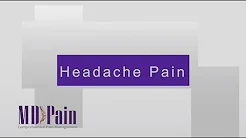Headache Specialist Denver
At MD Pain, we understand the debilitating effects that headaches can have on your daily life.
That's why we're dedicated to providing expert care for individuals suffering from headache pain in the Denver area.
Our team of specialists is committed to helping you find relief and regain control over your life.
Specialized Headache Treatment
As headache specialists in Denver, we offer comprehensive care for various types of headaches, including tension headaches, chronic migraines, primary headaches, and migraine headaches. We understand that each patient's experience with headache pain is unique, which is why we take a personalized approach to treatment.
At MD Pain, our headache specialists in Denver are well-versed in diagnosing and treating a wide range of headache disorders. Whether you are dealing with a chronic migraine, a cluster headache, or a primary headache, our team of experienced doctors is committed to providing comprehensive care tailored to your specific needs. Chronic migraines, characterized by persistent head pain, often come with other symptoms such as nausea, sensitivity to light and sound, and visual disturbances. Our specialists understand the complex nature of these conditions and utilize the latest diagnostic tools to identify the underlying causes, including issues related to blood vessels and other contributing factors.
Individualized Treatment Plans for Effective Relief
Our treatment plans are designed to address the unique needs of each patient, incorporating a combination of lifestyle modifications, medications, and advanced therapeutic techniques. The doctors at MD Pain work closely with patients to develop individualized treatment strategies aimed at reducing the frequency and severity of headaches. From acute treatments to preventatives, our comprehensive approach ensures that all aspects of your head pain are managed effectively. By focusing on holistic care, we aim to improve the overall quality of life for our patients, helping them return to their daily activities with minimal disruption. If you’re in Denver and struggling with chronic migraine or any other type of headache, trust MD Pain to provide the expert care you need.
Understanding Headache Pain
Headaches can manifest in different ways, ranging from throbbing pain to constant pressure. Our team is trained to identify the underlying causes of your headache pain, whether it be related to blood vessel issues, muscle tension, or neurological factors. By understanding the root cause of your headaches, we can develop an effective treatment plan to alleviate your symptoms and prevent future occurrences.
Comprehensive Treatment Options
We offer a variety of treatment options to address headache pain, including trigger point injections, nerve blocks, physical therapy, and medication management. Our goal is to provide holistic care that targets both the symptoms and the underlying causes of your headaches, allowing you to experience long-term relief and improved quality of life.
Expertise in Headache Management
With years of experience in headache management, our team has helped countless patients find relief from their symptoms. Whether you're dealing with occasional headaches or debilitating migraines, we have the knowledge and expertise to provide the care you need. Our headache specialists stay up-to-date on the latest advancements in headache treatment, ensuring that you receive the highest standard of care.
About Common Types of Headaches
Headaches come in different varieties, and each can command different forms of treatment. At MD Pain, we treat all types of headaches, ranging from the most common to the most unusual. Primary headaches, such as tension headaches and migraines, originate from neurological factors, while secondary headaches, like those caused by underlying medical conditions, require thorough evaluation and management by our headache specialists in Denver.
Tension Headaches
Whether a person gets migraines, cluster headaches, primary headaches, sinus headaches, tension headaches, or TMJ headaches, various potential methods can bring relief. Because headaches have various etiologies, an expert in pain management is an excellent place to seek migraine treatment. Skilled physicians understand how various headaches evolve and therefore understand various treatment methods.
Cluster Headaches
Cluster headaches are relatively rare. Further, while headaches tend to plague women more than men, cluster headaches are more common in males.
These headaches are characterized by a series of headaches that usually occur on one side of your head or near the eye area. The series of attacks come in clusters lasting from 15 minutes to three hours and can be a daily occurrence for weeks or months on end.
The cause of cluster headaches is still an unsolved scientific mystery, but it’s believed that cluster headaches are caused by the body suddenly releasing histamine as an allergic response near the trigeminal nerve (a facial nerve).
Headache Pain Relief
In addition to prescribing medication, such as tricyclic antidepressants, which are well known to help with headaches, other medication options exist, as well as injections, and even prescription nasal sprays that can help interrupt a headache or prevent its onset.
If you experience debilitation from headaches or migraines, please schedule an appointment with MD Pain to discuss the various treatment options that exist for your type or types of headaches. Our headache expert will perform a physical examination and look at your medical history to determine what treatment plan or preventive medicines to take with your headache medical condition.
Conveniently Located in Denver
Our headache specialist clinic is conveniently located in Denver, making it easy for residents to access the care they need. Whether you're in the heart of the city or the surrounding suburbs, our clinic is easily accessible from all major highways and thoroughfares.
Schedule Your Appointment Today
Don't let headache pain hold you back any longer. If you're struggling with chronic headaches or a chronic migraine, our team of specialists is here to help. Contact MD Pain today to schedule your appointment with a headache specialist in Denver. Relief is within reach.
Frequently Asked Questions
When you get headache pain, you may experience a range of symptoms. The primary head pain may feel dull and achy or sharp and intense. The pain may occur on one side of your head or the other, or it may manifest at the back of your head. This head pain may be accompanied by other symptoms, including nausea and vomiting, sinus pressure, or a feeling of tightness around the head.
With chronic migraine headaches, other head pain symptoms develop, including things like:
Sensitivity to light and sound
Pounding or throbbing pain on one side of the head
Hot and cold sensations
Blurred vision
Fatigue
Visual disturbances like flashing dots, wavy lines, or blind spots (auras)
Some migraine sufferers also experience a pre-migraine stage, called prodrome, where they may have food cravings, concentration issues, and irritability, among other symptoms.
Headaches and migraines may occur on their own, called primary headaches, or they may be a side effect of another condition. These are called secondary headaches.
Headaches may occur with an infection, such as a sinus or ear infection, or with conditions like glaucoma and meningitis. Dehydration can cause headaches, as can high blood pressure.
Chronic headaches, including migraines, can result from extreme stress and carrying tension in and around the neck. They can also be brought on by certain foods, food additives, or alcohol.
Your pain management specialist at Metro Denver Pain Management (MD Pain) finds a solution that can reduce the severity and frequency of your headaches and migraines. Depending on the specifics of your case, your doctor may suggest:
- Over-the-counter pain relievers
- Prescription headache medications
- Hot or cold compresses
- Therapeutic massage
- Relaxation techniques
- Occipital Nerve Blocks
- Trigger point injections
In many situations, your doctor may take a multidisciplinary approach and combine migraine treatment approaches.



